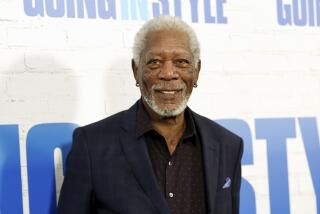Black Contributions to History
- Share via
During Black History Month, suppose I walked into a high school classroom filled with black students and asked these questions: Who invented the first clock in America? Who was the first patriot to die at the start of the American Revolution?
I’m convinced that I could walk out of that classroom with only a handful of students correctly answering that Benjamin Banneker invented the clock, and that Crispus Attucks was the first person cut down by British bullets on Boston Common. And that both were black men.
Now what if I asked the same students who Michael Jordan or Michael Jackson is? I don’t think there would be any blank looks.
While I can bemoan the lack of awareness by black students about their own heroic figures of the past, I can’t blame them. Americans of all colors still remain abysmally ignorant of the contributions blacks have made to American history.
The irony is that Black History Month celebrated this month has done virtually nothing to change this sad fact. Carter G. Woodson, the pioneer black historian and educator, certainly had lofty intentions when he initiated what was then called Negro History Week 60 years ago.
He wanted to reclaim black people’s history. He wanted to make it a source of pride for blacks. During his day, blacks were scarcely mentioned in general history texts, other than in a section on slavery.
Woodson was one of a small band of black intellectuals who battled to get blacks in the history texts. Schools, universities and textbook writers generally turned a deaf ear to their pleas. It took the civil rights movement of the 1960s to make the general public recognize that blacks too have made valued and rewarding contributions to America.
Today, Black History Month has become an established tradition. Officials declare special days, issue proclamations and hold tributes to honor past black achievements. But when March comes, it’s back to business as usual.
Surely, more can and must be done to make Americans aware of black contributions year around. Much of the fault for this not happening, unfortunately, lies with black historians and educators.
They fail to stress that black history is American history. They fail to tell how the black experience has enriched the lives of all Americans. Black history was, in effect, isolated into a “for blacks only” cubicle, to be treated as little more than a footnote to the “real” history of the country.
It is just as vital that all Americans know and appreciate what blacks have done. Textbook writers should not have been allowed to jam the deeds of blacks into separate chapters. Blacks like other Americans have made discoveries, contributed ideas, and performed magnificent feats that cross every field--industry, science, labor, military, and education.
The contributions of W.E.B. DuBois should be included in chapters on education, literature, sociology and political science. Dr. George Washington Carver is somewhat hazily identified as the black man who worked with the peanut. But in truth he made many agricultural discoveries that had a major impact on the food industry.
And what about inventor Jan Matzeliger who created the first machine to attach soles to shoes. Charles Crew established the first blood plasma bank, saving the lives of countless servicemen during World War II. Every American benefited.
Can Southern history be taught honestly without examining the role blacks played in Reconstruction governments--both good and bad? There were abuses and mistakes by blacks. But they also played a major part in giving the South and the nation workable and lasting models for public education, old-age relief and universal suffrage.
Americans should also know that the fight of black labor leader S. Phillip Randolph in the 1920s and 1930s opened the lily-white ranks of the American Federation of Labor to black workers. His efforts also brought greater union democracy and better wage and working conditions to all workers.
Teachers should teach, and public officials should acknowledge, black history as American history. Only then will black high schoolers, and all Americans, recognize the name of Benjamin Banneker as quickly as that of Michael Jackson.
EARL HUTCHINSON
Inglewood
More to Read
Sign up for Essential California
The most important California stories and recommendations in your inbox every morning.
You may occasionally receive promotional content from the Los Angeles Times.













